As soon as I entered the Golden Triangle, an estate agent’s window set the tone. A sign boasted of Exclusivité, Paris 8 and the prices made it very clear that only la crème de la crème need apply. Four and half million euros for a three-bed flat and nearly 13 million for a couple more rooms and a swimming pool. It would be strictly window shopping only for me, gawping my way round the three avenues – Avenue George V, the Champs Élysées and the Avenue de Montaigne which make up the Triangle d’Or.Bistrot Marius on the Avenue George V. Photo: Marian Jones I’d started at the Place de l’Alma end of Avenue George V where the Bistrot de Marius had a nautical flavor – a striped awning, a menu featuring oysters and vol au vent de Saint-Jacques and a sign saying the outdoor fish counter sold only the freshest catches, straight off the boat: pêche de petit bâteau selon arrivage. A few doors up came the Crazy Horse Theater, where glamorous girls draped in (not that many) beads have been performing their “sensual and sexy cabaret” since 1951. It was too early in the morning for the promised “pinpoint precision choreography and sophisticated allure,” but I’d be intrigued to experience the “totally crazy night out” another time and discover how balance is kept on those dizzyingly high heels.
Crazy Horse on the Avenue George V. Photo: Marian Jones Further along Avenue Georges V, on the other side, came the American Cathedral. Steps led up through an arched entrance to a pretty courtyard with a memorial cloister running alongside it, dedicated to “all those who died in Europe for liberty and justice during the two World Wars.” That is 138,000 members of America’s Armed Forces. Individual plaques gave the numbers buried in the various American Military Cemeteries across Europe – 10,629 in Normandy alone, for example, the precise number an indication of respect for every single one of them. In the cathedral itself, a bald eagle gazed upwards from the lectern, a proud symbol of the American nation. On my way out, I spotted a cushion embroidered with Benjamin Franklin’s picture and his dates, 1706 -1790.
This is the 28th in a series of walking tours highlighting the sites and stories of diverse districts of Paris.
As soon as I entered the Golden Triangle, an estate agent’s window set the tone. A sign boasted of Exclusivité, Paris 8 and the prices made it very clear that only la crème de la crème need apply. Four and half million euros for a three-bed flat and nearly 13 million for a couple more rooms and a swimming pool. It would be strictly window shopping only for me, gawping my way round the three avenues – Avenue George V, the Champs Élysées and the Avenue de Montaigne which make up the Triangle d’Or.
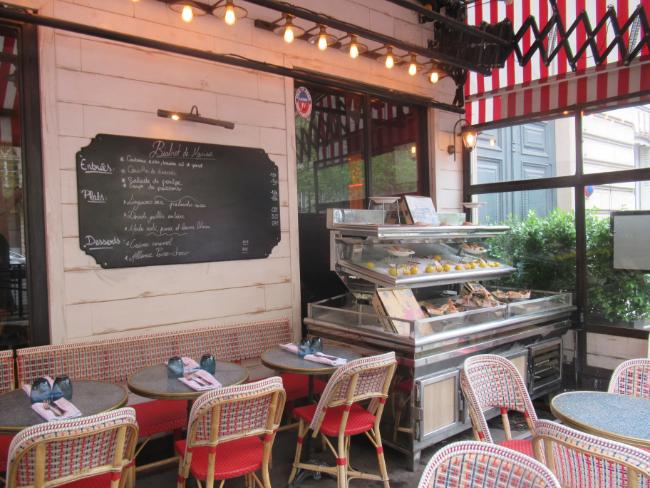
Bistrot Marius on the Avenue George V. Photo: Marian Jones
I’d started at the Place de l’Alma end of Avenue George V where the Bistrot de Marius had a nautical flavor – a striped awning, a menu featuring oysters and vol au vent de Saint-Jacques and a sign saying the outdoor fish counter sold only the freshest catches, straight off the boat: pêche de petit bâteau selon arrivage. A few doors up came the Crazy Horse Theater, where glamorous girls draped in (not that many) beads have been performing their “sensual and sexy cabaret” since 1951. It was too early in the morning for the promised “pinpoint precision choreography and sophisticated allure,” but I’d be intrigued to experience the “totally crazy night out” another time and discover how balance is kept on those dizzyingly high heels.
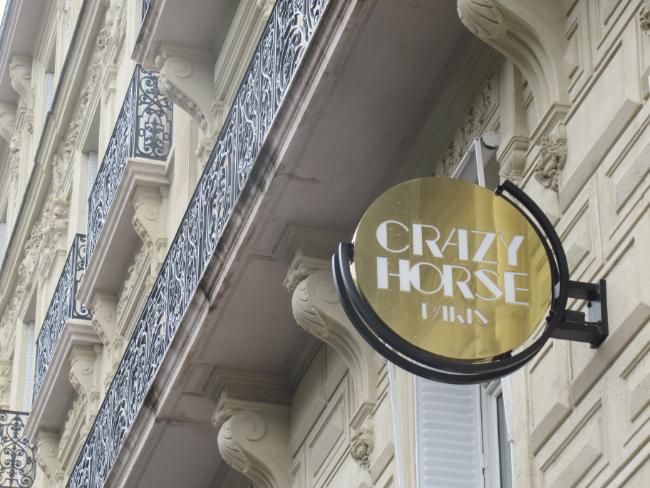
Crazy Horse on the Avenue George V. Photo: Marian Jones
Further along Avenue Georges V, on the other side, came the American Cathedral. Steps led up through an arched entrance to a pretty courtyard with a memorial cloister running alongside it, dedicated to “all those who died in Europe for liberty and justice during the two World Wars.” That is 138,000 members of America’s Armed Forces. Individual plaques gave the numbers buried in the various American Military Cemeteries across Europe – 10,629 in Normandy alone, for example, the precise number an indication of respect for every single one of them. In the cathedral itself, a bald eagle gazed upwards from the lectern, a proud symbol of the American nation. On my way out, I spotted a cushion embroidered with Benjamin Franklin’s picture and his dates, 1706 -1790.
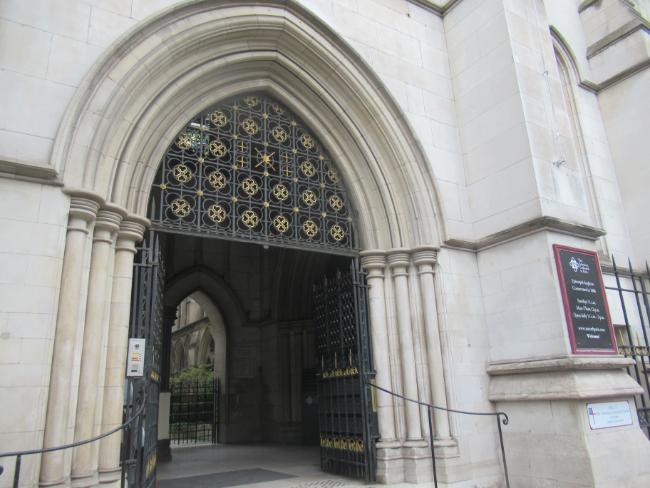
At the Four Seasons Hotel George V, flags flew over the heads of the uniformed footmen, stationed sentry-like either side of the entrance, watching long black cars slide silkily in and out of the parking area. One besuited new arrival was unloading a dozen suitcases, all black with a soupçon of gold trim. Matching, in fact, the décor on the front of the building where the pristine black rails were hung with “garlands” in golden metal and large medallions showing King George or the intertwined letters K and G which represented him. I wondered if the king had ever stayed there himself. I know both Winston Churchill and Elvis Presley did.
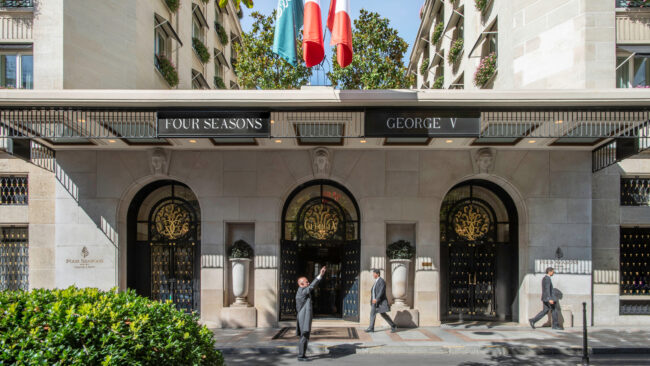
courtesy of Four Seasons Hotel George V, Paris
Another iconic hotel, Fouquet’s, was a little further along. The footmen flanking the cream-colored façade were a given, the red carpet crossing the pavement into the entrance seemed only slightly surprising, but the English-style apostrophe in the name? Pourquoi? Adjoining the hotel, just on the corner, was the Fouquet’s restaurant, where the set meal costs 99€, perhaps to match its address at 99 Champs Élysées. For that, I could have not just entrée, plat et dessert, but a celebratory coupe de champagne to kick things off. And to get in I’d have to walk over a set of golden plaques bearing the names of celebrities: Isabelle Huppert, Alain Delon, Juliette Binoche. One day, perhaps.
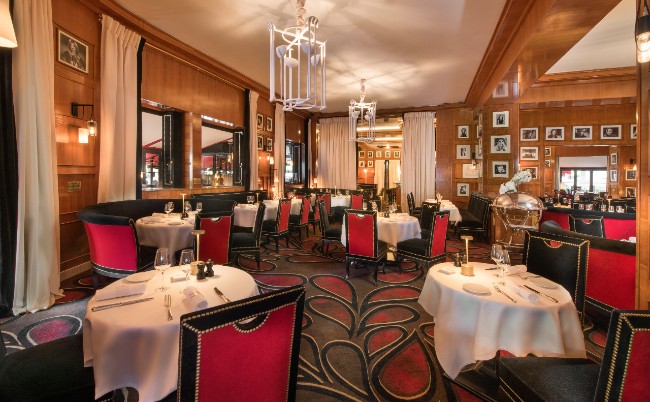
It’s the classiest of corners. Eyes left brought a view of the Arc de Triomphe and, much closer, another icon, the flagship Louis Vuitton store. The L and V of his logo are intertwined in gold and black, just like George V’s. Across the road was another stunning LV building – he’s so famous the shorthand will surely do – where cream and golden squares cascaded artily across the façade. Nearby, clustered more high-end stores where the window-dressers vie to outdo each other: Ladurée, with tumbles of matching pink macarons and roses, Rolex with an all-yellow display as a backdrop for golden watches, the lovely Guerlain shop with its art nouveau carvings.
There was also an information panel about changes to the Champs Élysées, some of which won’t take place until after the Olympics. It described the avenue as a tired old lady with quelques rides – a few wrinkles – in need of rejuvenation. The plan is – what a lovely phrase – to “re-enchant her” and turn her back into the promenade historique of old. I’ll watch this space, I thought, spotting that the Lancôme shop nearby was offering to do a similar thing for me. Come in, said the sign nestling amid (more!) pink roses, and on the first floor we can offer you “luxury treatments where science and beauty meet.” Maybe another time?
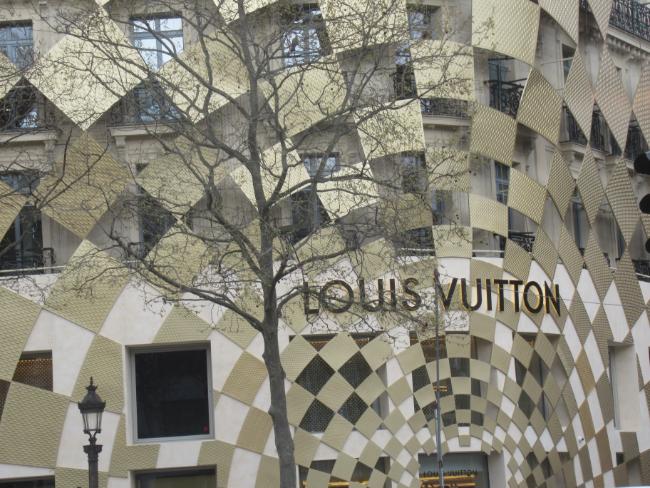
Just at the turning into Avenue de Montaigne came the stunning Maison de Vente aux Enchères, an upmarket auction house and art bookshop combined. I peered through the palatial black and gold wrought-iron gates, and wondered whether to go in. A confident young couple, expensively dressed, swung open the gate and disappeared up the stone steps into the imposing entrance. I was suddenly very conscious of my damp appearance after a morning in the drizzle and decided against it. Another time, I would dress for the occasion and go for it, but today I simply rounded the building, admiring the art nouveau stone carvings all along the top, and continued my planned route.
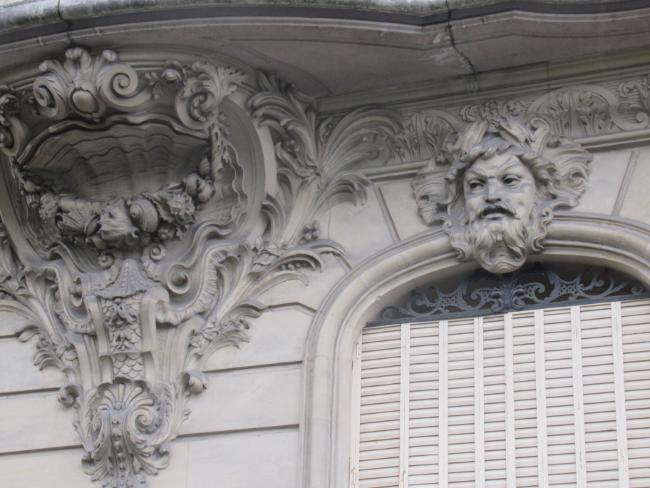
I’ve seen Avenue de Montaigne described as an “illustrious avenue of Haute Couture.” It was understated exclusivity from the start, the shops so discreetly placed behind imposing facades that I had to look twice to notice some of them. But all the big names in fashion were there – Balenciaga, Ferdi, Chanel, Valentino, Dior – and the windows were works of art. At Jimmy Choo, one window displayed a trio of vertiginous high heels in metallic silver, pink and blue. At Versace were more shiny ankle-breakers, all in black and cream with, bien sûr, matching boxes. My favorite was a delectable display of children’s wear, fille et garçon, where the tiny mannequins stood amid a sea of pastel-colored flowers. Here, unlike most of the other shops, the prices were displayed, somewhat puncturing the cuteness rating. 250 Euros for the sweetest tiny robe smockée, another 300 if you wanted to add the matching cardigan and shoes.
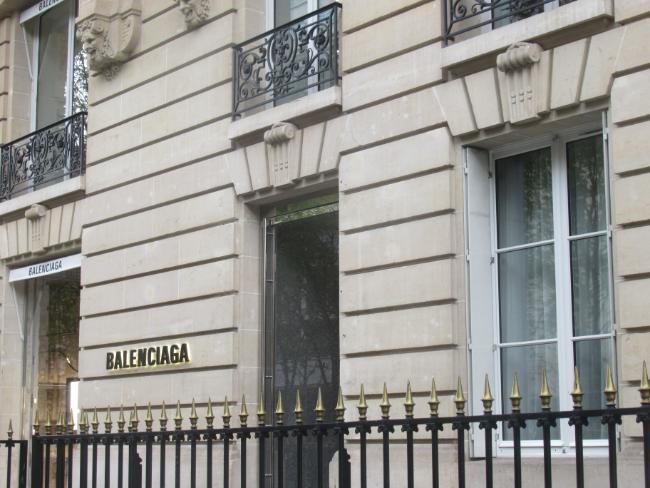
Then came the Plaza Athénée, another of the city’s swankiest hotels where a room can be had for about a thousand euros, but you could pay 20 times that for something really smart. Here, splashes of red enlivened the black, cream and gold, said to date from a romantic story involving Marlene Dietrich in the 1950s. She dined one evening with the actor Jean Gabin who asked the management to decorate his balcony with hundreds of red roses in tribute to her. So now, the balconies and the planters all feature red. Also red was the umbrella, swiftly unfurled by one of the doormen over a guest who was just emerging from a large, shiny black car.
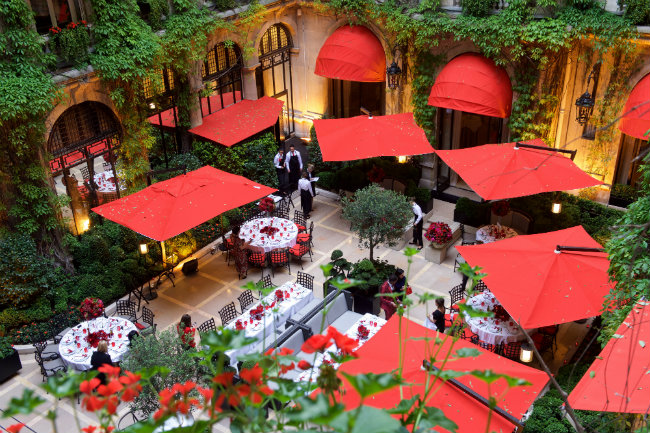
courtesy of Hotel Plaza Athénée
Just at the end of the Avenue came the Théâtre des Champs Élysées, opened in 1913, the same year as the Plaza Athenée, and famed for the riot which broke out when Stravinsky’s Rite of Spring premiered there. It was set to be quite an evening in the new theater, described by a German visitor as “the most dazzling house I’ve ever seen in Paris.” But some audience members, perhaps expecting something more sedate in such surroundings, were profoundly shocked by the dissonant music and jerky dance movements and uproar ensued. Today, the theater stages mainly operas and classical concerts, but it has two smaller stages which offer alternatives. I noticed a poster for the Comédie Studio for sets by female comedians where, it promised, “tout rentrera dans le désordre” – everything will turn to chaos.
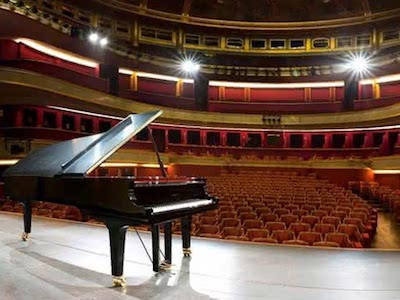
Théâtre des Champs Élysées. Photo: Bernard Martinez
Chaos? How will that play in the Golden Triangle, where everything is so serene and elegant? Just opposite the studio was yet another set-piece scene in the regulation colors: black wrought-iron fencing, topped with golden spikes, matching balcony railings set against a smooth, creamy wall, a perfect, candelabra-style Parisian lamppost. All was as it should be, which I think might be the motto for the lovely, but extremely orderly, area known as the Golden Triangle.
Lead photo credit : Champs Élysées. Photo credit: iStock – GlobalP

